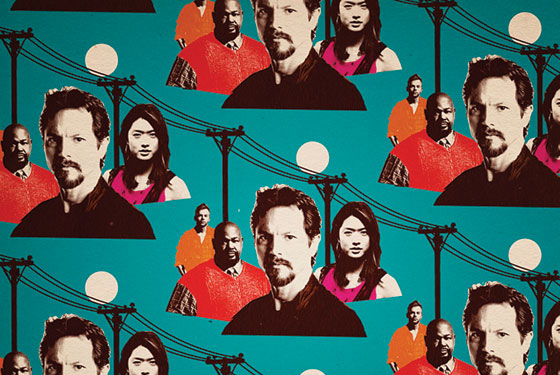
William Banks (Benjamin Bratt) calls himself an “interventionist.” This means that, on the one hand, he’s a sort of social worker specializing in families in distress. But on the other hand, he’s also a vigilante who will do whatever it takes to achieve rough justice, from engineering an abduction to instigating a riot. There is, of course, something namby-pamby about social work, always playing by the book. Whereas vigilantes get to make up their own righteous rules, like toddlers in a sandbox. Temperamentally, William is more righteous than he’s namby-pamby. He belongs in the do-good-bang-bang company of Edward Woodward on the TV serial The Equalizer, who proffered his services as an ex-spy, Lone Ranger, and guilty father in a classified newspaper ad, or Travis McGee in John D. MacDonald’s mystery series, who could always be coaxed off his houseboat for some Sir Galahadding, or the furious ex-con Burke in the Andrew Vachss thrillers, determined to track down every pedophile in the sewers of the city. What moves William to sudden, violent action, what really fries his circuits, is addiction.
William, too, was once addicted, unto jail and rehab, apparently to heroin. Upon the birth of his youngest child, he had one of those chats with God that are increasingly popular on prime-time television, promising to become an avenging angel if only the Big Guy would cut him some slack. And so here he is, maybe ten years later, not entirely trusted by his shell-shocked family, looking a bit too much like Che Guevara, still sneaking the odd smoke, but otherwise a clean machine, running a truck full of (perhaps symbolic) welding tools—and deploying a team of reformed sinners to snatch sick souls from the jowly temptations of booze, dope, gambling, and fornication. For the purposes of the Cleaner pilot, this team features Grace Park from Battlestar Galactica as the slinky sex object in the yellow sports car, Gil Bellows from Ally McBeal as a tattooed muscleman whose sobering up didn’t save his marriage, Esteban Powell as the requisite needy screwup, and Darnell McDowell as a used-car salesman. By the end of the hour, one of them will be dead.
It must be said that this group lacks the diversity and animal magnetism even of The A-Team, much less the extended family that assists Burke in the Vachss novels—from Max, the deaf-mute Mongolian martial artist, to Mole, an antisocial Nazi-hating electronics genius, to Michelle, a gorgeous transsexual. But Benjamin Bratt on his lonesome almost makes up for William’s pallid cohort. From Law & Order, E-Ring, and last month’s mini-series remake of The Andromeda Strain, we are accustomed to seeing him buttoned down and uptight, even if not in uniform, all tensile strength and emotional repression, Vesuvius needing to pop its cork. In The Cleaner, he’s a mess, shouting at his wife, forgetting to pick up his daughter at school, suspecting his best friend of using steroids, the autocrat at the breakfast table. “I don’t pray; I talk,” he says of his relationship to God. More often, though, at everybody else, he shouts.
And it is this complication of character that makes The Cleaner worth our time. Never mind that the real work of intervention is more like a lab experiment or a military campaign than a free-for-all brawl or snatch-and-grab, or that the real work of recovery is an arduous, tedious business of meetings and service instead of lullabies, bumper stickers, and epiphanies. By going gothic on us in its last five minutes, by reminding us that about 75 percent of all those who enter a recovery program will relapse, by suggesting that our very own hero, with his martyred Renaissance look, might not make it, The Cleaner could even be said to point the way back to social work: increments of grace.
The Cleaner
A&E. Premieres Tuesday, July 15,
at 10 p.m.